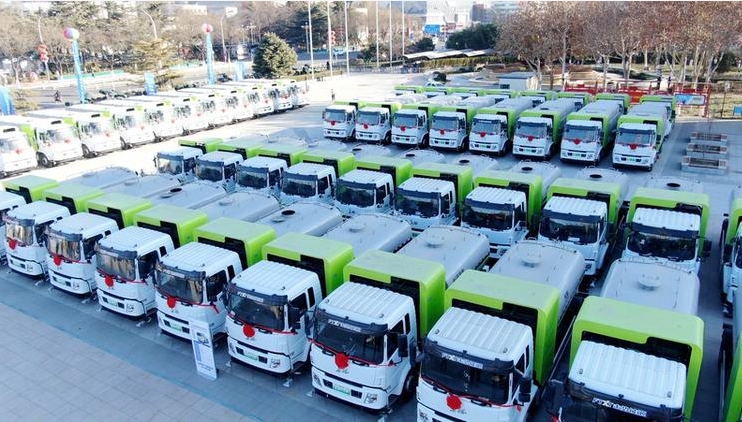
Transforming Sanitation with Hydrogen Technology
On January 10th, 2025, GWM HYDROGEN-FTXT delivered 406 hydrogen-fueled sanitation vehicles in Baoding, China, marking a breakthrough moment for hydrogen energy innovation. The name “GWM” stands for “Go With More,” and it’s clear the company is living up to that promise—more innovation, more sustainability, and more impact. This milestone isn’t just about numbers; it’s proof that hydrogen fuel cells are ready to power large-scale operations. By integrating clean energy into essential urban services, GWM is making “more” mean cleaner cities, reduced carbon emissions, and a solid step toward a sustainable future.
The fleet includes three specialized models—hydrogen sweeping and washing vehicles, hydrogen cleaning vehicles, and hydrogen high-pressure flushing vehicles. These were co-developed with leading Chinese commercial vehicle manufacturers Changzheng, Yutong, and Dongfeng. The vehicles integrate GWM HYDROGEN-FTXT’s proprietary fuel cell and hydrogen storage systems, offering significant advantages over electric alternatives, including rapid refueling within just 5-8 minutes and the ability to operate continuously for over 10 hours, regardless of extreme temperatures.
This delivery represents the company’s first “hundred-unit level” hydrogen demonstration in sanitation applications, building upon their earlier success with a fleet of hydrogen heavy-duty trucks. Acting as “mobile air purifiers,” these vehicles aim to enhance urban air quality while promoting a low-carbon circular economy matching China’s “waste-free city” initiative.
Inside GWM’s High-Power 255kW Hydrogen Fuel Cell System
The company has made notable strides in hydrogen engine technology, including their advanced 255kW high-power hydrogen fuel cell system, highlighted at the IAA Transportation 2024 conference. This system underscores the company’s ability to develop high-performance hydrogen solutions tailored for commercial applications. It boasts enhanced fuel efficiency and modularity, catering to a range of vehicle types from city buses to logistical carriers.
Here’s a bullet-point summary of the GWM HYDROGEN-FTXT truck engine specifications:
Fuel Cell System:
255kW high-power hydrogen fuel cell engine.
Utilizes a 300+kW expanded graphite plate stack.
Features a second-generation high-performance membrane electrode.
Hydrogen Storage:
Equipped with the “Jupiter” large-capacity onboard liquid hydrogen storage system.
Capable of storing over 80kg of hydrogen with a storage density of ≥8wt%.
Supports a range of over 1000km.
Performance:
Designed for mid-to-long-distance and heavy-duty commercial transport.
Offers solutions for 300-500km mid-range and 500-1000km long-haul distances.
High energy density and efficient storage and transport capabilities.
Technological Advancements:
Breakthroughs in ultra-low temperature and high-flow hydrogen transportation.
Enhanced safety, reliability, and efficiency in hydrogen utilization.
Global Integration:
Active in global industrial and supply chain integration.
Collaborates internationally to expand hydrogen energy applications.
The proprietary technology integrates hydrogen storage tanks with maximum energy density, ensuring both safety and operational efficacy. Combined, these systems enable extended driving ranges and adaptability to demanding commercial environments, further emphasizing hydrogen’s potential as a sustainable energy source.
Expanding Applications with Hydrogen Auto Carriers
GWM HYDROGEN-FTXT recently announced the launch of their first operational hydrogen-powered auto carriers. This fleet of 16 trucks has been deployed to provide logistics services across China. Capable of a 400 km range on a single refueling, each truck can transport 8-10 passenger vehicles. Compared to diesel counterparts, these carriers offer superior performance, reduced noise, and greater fuel efficiency, addressing the high-capacity, safety, and eco-efficiency needs of modern logistics.
Beyond these auto carriers, the company’s portfolio already includes heavy-duty trucks, transit buses, wing van vehicles, and sanitation units. By the end of 2023, the company plans to introduce hydrogen-powered specialty vehicles, such as refrigerated trucks, further diversifying its applications in commercial and municipal sectors.
Why Hydrogen Matters and What Lies Ahead
Hydrogen fuel cell technology has emerged as a critical component in reducing dependence on fossil fuels and addressing climate change. It provides a practical solution for industries where electrification is challenging, such as heavy-duty transport and logistics. GWM’s recent achievements demonstrate hydrogen’s flexibility in meeting these unique demands.
The Chinese government’s strong policy commitment to hydrogen includes a target of one million hydrogen fuel cell vehicles on roads by 2030. This creates a robust framework for companies like GWM to advance their innovations and expand adoption. Given this trajectory, significant progress in hydrogen infrastructure, including refueling stations, is expected over the next five years to support wide-scale deployment.
How Hydrogen Technology Can Shape the Future
The advancements seen in projects like GWM HYDROGEN-FTXT’s sanitation vehicles and auto carriers highlight the immediate potential of hydrogen-based solutions. Municipalities and industries globally can explore this technology for clean public service operations and long-distance logistics. Its rapid refueling and long operational durations make hydrogen fuel cells ideal for applications where battery-electric alternatives face limitations.
Local governments and private sectors can begin adopting hydrogen technology by piloting projects in areas such as waste management, public transportation, and shipping. For long-term scalability, investments in hydrogen production, such as green hydrogen derived from renewable energy, and distribution infrastructure are essential.
Hydrogen’s role in decarbonization is clear. By integrating it into strategic applications today, societies can pave the way for a cleaner, more sustainable future, ensuring that hydrogen technology not only thrives but truly reshapes the environmental and energy landscape.